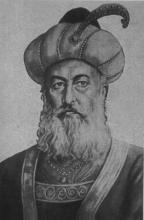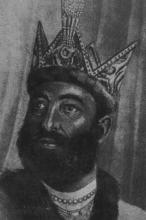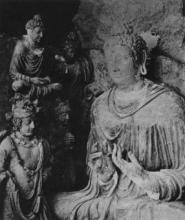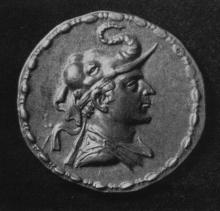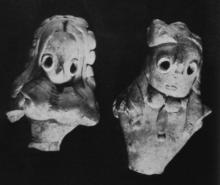The Ghorids who delivered the death blow to the Ghaznavids are a classic example of the sometimes independent, sometimes semi-independent local chieftains to which this discussion has referred so often. Living in the high mountains east of Herat where the rugged terrain discouraged outsiders from all but periodic raids for plunder, slaves or tribute, these chieftains dwelt in heavily fortified villages happily engaging in their personal contests.
The right of these local rulers to rule rested solely upon their personal strength and charisma; seats of power were fair game for anyone strong enough to take them. Taking advantage of this situation, Alptigin, a Turkish slave deposed as Commander-in-Chief of Samanid forces in Khurasan, marched south and estab-lished himself as master of the fort of Ghazni in 962 A.D.
In 637 A.D., only five years after the death of the Prophet Muhammad, the Arab Muslims shattered the might of the Iranian Sassanians at the battle of Qadisiya, and the invaders began to reach into the lands east of Iran. The Muslim conquest was a prolonged struggle in the area that is now Afghanistan. Following the first Arab raid into Qandahar in about 700, local rulers, probably either Kushans or Western Turks, began to come under the control of Ummayid caliphs, who sent Arab military governors and tax collectors into the region.
Decadence sapped the power of both China and Rome and gravely disrupted the trade upon which Kushan prosperity de-pended. At the same time, civil wars following Kanishka's death so weakened the Kushans that they fell under the sway of the recently established Sasanian Empire of Persia. Reduced to provincial status by the middle of the 3rd Century A.D. (241 A.D.) they were subsequently swamped by a new wave of nomadic in-vasions from Central Asia. The Hephthalites (White Huns) came into Afghanistan about 400 A.D.
Restless nomadic tribes living in Central Asia had long been of concern to the rulers of Bactria and their relentless encroachments into the settled areas fill the pages of the area's early history. Real nomadic political power in Afghanistan was, however, first established by the Yueh-chih who, forced from their grazing lands on the Chinese border, enter this story as a loose confederation of five clans. United under the banner of one, the Kushan, they wrote one of history's most brilliant and exciting chapters in Afghanistan.
Three years after Alexander left India he died in Babylon (343) a.c.) and, while his Companions fought over the division of his conquests, independent local dynasties in the east rose and pros-pered.
Alexander the Great crushed the Achaemenid Empire. By the time he stood on the threshold of Afghanistan the last Achaemenid King, Darius III, lay dead, murdered by his Bactrian allies. Alex-ander's armies momentarily exulted in the belief that their task was complete; they yearned to be homeward bound. But the young, still in his twenties, conqueror dreamed of equaling, if not sur-passing the conquests of Darius I.
A pastoral, cityless, people led by heroic warriors riding two-horsed chariots came out of the north to shatter the great Cities of the Indus Valley. In the sacerdotal writings of the Vedic Aryans, the Rigveda, we read of the Kubha (Kabul) River and know of their passage through Afghanistan sometime around 1500 B.C. In the related Persian hymns of the Avesta, we read of Bakhdi (Balkh) "the beautiful, crowned with banners" and of Zarathustra Spitama (Zoroaster), the great politico-religious leader who lived in Balkh sometime between 1000 and 600 B.C.
Early man in Afghanistan lived on river terraces and inhabited caves and rock shelters. Countless stone tools scattered about the countryside attest to this and each year archaeological excavations add substance to the picture of life in the Afghan area during the distant past.
Ahmad Shah Durrani's (the first king of Afghanistan), role in the history of the region is never well evaluated. None of the many historians ever bothered to place him within his proper historical and socio-political perspective. The reason why Ahmad Shahs merit was never recognized was his rise at a time when the Indian and Persian empires were disintegrating and the alien invaders from the West were scrambling into fill the vacuum. Whatever Ahmad Shah accomplished benefited the alien invaders and his achievements were eclipsed by the volatility of the time.
